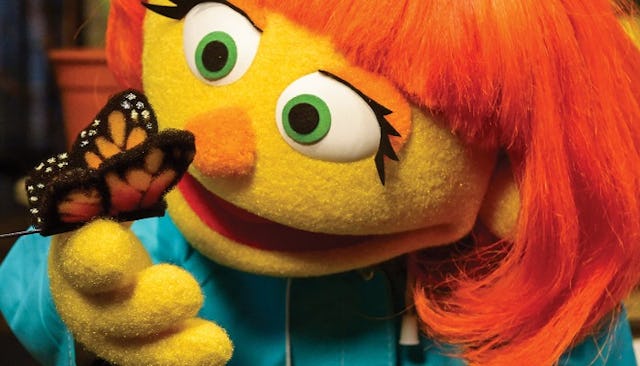Sesame Street's New Character Isn't Just For Kids On The Spectrum

Just two short months ago, my son was diagnosed with autism at 4 years old. I’m very new to this autism mom thing. My son is level 1, academically advanced, and presents in some ways that are atypical for being on the spectrum.
When my husband and I received our son’s diagnosis, some of our first questions for his doctor concerned the if, when, and how we should tell him.
Do we tell him right away?
It’s not a sad thing. Should I bake a cake to show him this isn’t bad?
Blow out the candles! You have autism!
Ultimately, we have decided to wait. We talk openly with our son about his strengths and weaknesses and the ways he is sometimes different from other kids. As he gets older and starts noticing things and asking questions, and we feel he can understand, we will find the right time to tell him. That might be a few years down the line, or it might be next week. When he’s ready, he will show us.
And so when I learned this week that Sesame Street would be debuting a Muppet character with autism, I was ecstatic. Seeing yourself represented on television is important, and when the time comes to tell my son, he will already have a basic idea of what autism is from watching one of his favorite shows. I went online and watched a few clips featuring the character, Julia, that were already available. I noticed the similarities between her and my son. I noticed the differences too.
Julia being a girl is probably the most important aspect of her character aside from her autism. It has been widely thought of as a disorder for boys because girls are significantly underdiagnosed. This is due to a wide range of issues including that girls often present differently than boys and can be better at hiding their disorder by adapting to social norms, even if they don’t understand them.
But it’s also crucial to keep in mind that autism is a lengthy spectrum. There are different levels, and there are spectrums within the levels. As we have gotten deeper into our journey, I learned a phrase I now hear often among parents and professionals:
If you know one child with autism, you know one child with autism.
I bring this up because, even though my son will see Julia and will one day know that he has autism like she does, I do not think he is going to see himself represented when he watches Sesame Street. And I believe that will be the case for most kids on the spectrum. That’s not a bad thing. It would be impossible for any show to represent all children, let alone all kids on the spectrum. But I don’t think that Julia is going to be as beneficial to autistic children as I initially thought she would be.
And that’s perfectly fine.
I was in my car just a couple of days ago, listening to a story about Julia on the radio. As I listened, my chest tightened up and my eyes filled with tears. Not because I was sad. Not even because I was thinking of the impact she may have on my son.
My first thought was of other children.
I thought of neurotypical children being exposed to a character with autism before they can even walk or talk. Children who may not have an autistic family member or classmate will be exposed to neurodiversity from an early age. The children we tend to think of as “normal” are the ones I think stand to benefit the most from a character like Julia.
My son is already having trouble making friends just in preschool because most of his classmates don’t understand his behavior or why he behaves the way he does. No one is cruel to him, and he hasn’t experienced anything that has made him feel bad about himself. But sometimes, kids who want to play with him aren’t able to because they don’t know how. They don’t realize that he can’t tolerate loud noises, or that they might need to ask him to play a few times before they get his attention. They’re put off by how scripted his speech is and that he tends to play at them instead of with them.
By watching Julia play with Abby, Elmo, Big Bird, and others on Sesame Street, neurotypical children are seeing some ways in which an autistic child might behave. And when they encounter an autistic child in the classroom or on the playground, they may be more tolerant and inclusive because it won’t be the first autistic child they’ve ever met. They already know Julia.
So, thanks Sesame Street. I appreciate it.